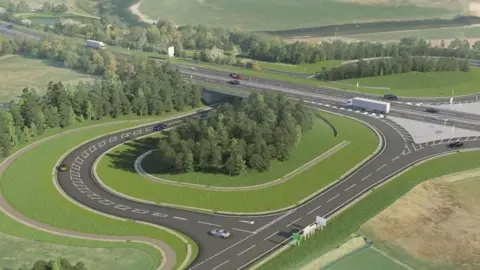'Accelerating' A9 dualling would not cut project time
 Transport Scotland
Transport ScotlandPlans to accelerate the dualling of the A9 have been rejected by transport bosses over concerns it would not save any time on the project.
Following a request from a committee of MSPs, Transport Scotland said efforts to speed up upgrades to the road risked affecting the revised end date of 2035.
The body said it would investigate plans to bring forward improvements to the Dalnaspidal Junction at Glen Garry.
Transport Secretary Fiona Hyslop said the current timetable for the project was "robust and practical".
Two sections of single carriageway on the A9, totalling about 11 miles (18km) of road have been upgraded over the past decade.
About 77 miles (124km) have still to be improved as part of the £3bn project, which will extend from Inverness to Perth.
Delays and rising costs have repeatedly hit the dualling upgrades, which were initially scheduled to be completed this year.
Former transport secretary, Mairi McAllan, announced a 10-year delay to the proposals in December 2023.
The citizen participation and public petitions committee presented a report to Transport Scotland in October which called for the dualling of certain sections to be brought forward.
But the body said reviewing the current timetable risked the certainty over the final cost, could cause further disruption to motorists and put the project at further risk of delay.
In its report, published on Tuesday, Transport Scotland said it had explored whether some sections should be speeded up on safety grounds, or where lengthy diversions could be put in place, should the road be closed.
It said it had considered introducing "overlapping" construction on the carriageway to speed up the project.
It also suggested rescheduling the planned programme of work around the areas of the road deemed to be least safe.
However, it said its findings revealed that current scheduling "achieves an earlier overall completion date than would be achieved were it to be rescheduled".
 Transport Scotland
Transport ScotlandThe report did acknowledge there may be scope for the Dalnaspidal Junction section – which will involve extending the Glen Garry dual carriageway north by about 0.6 miles (1km) – to be brought forward from its current completion date in 2025.
The Tomatin to Moy stretch, which was scheduled to be finished by the end of 2027, has been pushed back to 2028.
The total cost of upgrading that single carriageway section, which covers a distance of about six miles (10km), is expected to run to £308m – about £111m more than previously estimated.
Hyslop said "real progress" was already being made on the project.
She added that a £5m package of new short-term safety measures would be put in place by the end of March this year.
"I believe that the report demonstrates that the delivery plan is a robust and practical approach to undertaking this large programme of work in the years ahead," she said.
"We are already making real progress in delivering on the plan.
"In the next few months, I expect to see main construction work start on the Tomatin to Moy project, publication of draft orders for the Pass of Birnam to Tay Crossing project, contract award for the Tay Crossing to Ballinluig project and commencement of procurement for the Pitlochry to Killiecrankie project.
"The A9 safety group will continue to work together to explore any measures to positively influence driver behaviour to help reduce the numbers of people being injured or killed on the road."
'Deeply disappointing'
SNP MSP Fergus Ewing, who has campaigned for the dualling project, described the report's findings as "deeply disappointing".
He said it appeared that Transport Scotland had failed to properly seek the views of industry when producing the report.
"Did they have any meaningful discussions with industry?" he said.
"Did they not even hold a 'market day' where major contractors would be invited to contribute their views?
"It looks to me as if they failed to do this, despite the absolute necessity of working collaboratively with industry."
He added: "This is deeply disappointing - and a sham."
